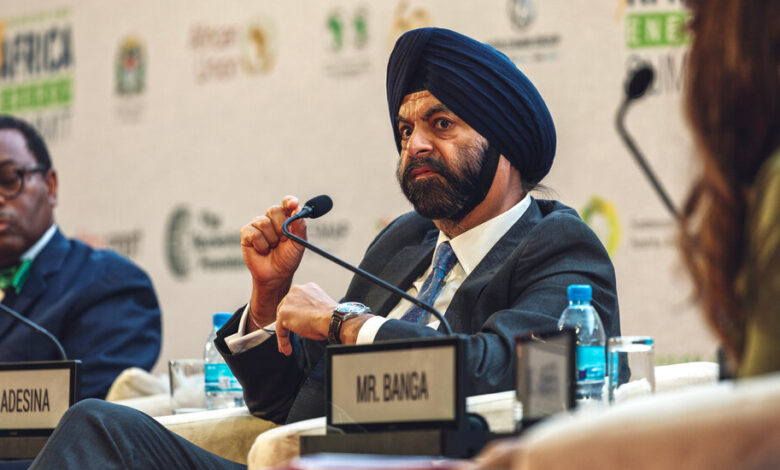The World Bank Pivoted to Climate. That Now May Be a Problem.

As the Trump administration imposes deep cuts on foreign aid and renewable energy programs, the World Bank, one of the most important financiers of energy projects in developing countries, is facing doubts over whether its biggest shareholder, the United States, will stay on board.
While the Trump administration has voiced neither support nor antipathy for the bank, it has issued an executive order promising a review of U.S. involvement in all international organizations. And Project 2025, the right-wing blueprint for overhauling the federal government, has pressed for withdrawal from the World Bank.
If the United States were to withdraw, the bank would lose its triple-A credit rating, two credit-rating companies warned in recent weeks. That could significantly reduce its ability to borrow money. Roughly 18 percent of the bank’s funding comes from the United States.
In an interview, Ajay Banga, the bank’s president, said his institution was fundamentally different from the aid agencies, such as U.S.A.I.D., that the Trump administration has been cutting. And he used some of the administration’s own talking points to argue the case: Investment in natural gas and nuclear power is good, he said, and the development projects funded by the bank can help prevent migration.
He also said that the bank makes money and shouldn’t be seen as charity from U.S. taxpayers.
“The World Bank is profitable,” he said, noting that it more than covers its own administrative costs even if most of its projects are designed to yield slim returns. “It’s not as though we take money every year from taxpayers to subsidize us and our salaries.”
The concern about the bank’s future is heightened as the second Trump administration doubles down on its repudiation of climate projects and promotes an accelerated expansion of U.S. oil and gas projects.
The United States wields enormous influence over the bank and effectively chooses its leader. David Malpass, nominated by President Trump in 2019, doubled the bank’s climate financing. But he resigned shortly after wavering during a 2023 public event at The New York Times on whether he accepted the scientific consensus that fossil fuels drive climate change.
Mr. Banga was then nominated in 2023 by President Biden. He committed to channel 45 percent of the bank’s funds on climate related projects, an increase of 10 percentage points from his predecessor.
The World Bank, created in 1944 to rebuild postwar Europe, is the world’s largest multilateral lender. It funds a range of projects for poor countries and emerging economies, such as the development of high-yielding crop seeds, the installation of school roofs that better withstand cyclones, and the construction of roads, bridges and all sorts of energy projects.
The Bank has long been criticized by environmental advocates for supporting projects that harm communities and ecologies, including hydroelectric dams and gas pipelines.
The bank faces an immediate problem. In December, Congress authorized the Biden administration’s pledge to contribute $4 billion in grants and loans for the world’s poorest countries through the bank. But a new, Republican-controlled Congress will need to agree to include annual tranches of that money each year in its budget.
Mr. Banga said he expected the money to come through as part of normal country-to-bank transfer process. He also said he has met with lawmakers in Congress and with some current administration officials before they took their posts, but declined to say with whom.
The Treasury Department did not respond to a request for comment, nor did the Senate Appropriations Committee, now Republican-controlled. The House Financial Services Committee, also Republican-controlled, declined to comment.
But the bank also faces a more existential problem: Will the Trump administration continue its support for the institution, and if it does, will it back Mr. Banga’s goal to channel nearly half of its money into helping developing countries adapt to the hazards of a warming planet and build energy systems that contribute less to climate change?
Mr. Banga said he did not know what the administration’s plans were. Nor has he yet had a direct discussion with anyone at the White House, nor with Elon Musk in his role as looking for ways to sharply reduce government spending.
“Who knows what they’ll decide tomorrow? I’m trying to show them — I’ve been showing this for the past two years — what is it that I do that is useful to you,” he said. “What I do is I take your dollar and I multiply it.”
Kevin Gallagher, director of the Boston University Global Development Policy Center, said that the White House could do one of three things. It could pull out and withdraw its money. It could pull out but keep its money in the bank. Or, it could stay in and demand that projects focus on fossil fuels.
For the current financial year, about a half-percent of the bank’s $97 billion in investments are in gas, compared with about 3 percent for renewable energy projects. While gas burns more cleanly than coal or oil, its increasing use is contributing to a continuing rise in global greenhouse gas emissions, the primary driver of global warming.
In any event, the uncertainty is likely to be felt this week at a meeting of finance ministers of the world’s 20 largest economies in Cape Town, South Africa.
The theme for the G20 meetings this year is “solidarity, equality, sustainability,” which the administration considers at odds with its views on climate change and diversity policies. The Times reported last week that Scott Bessent, the Treasury secretary, would not attend the meetings.
Developing countries “are rapidly preparing for a drop-off in U.S. climate funding for sure,” Mr. Gallagher said. “And yes, of course that means they will be asking China for more financing.”
Japan and China have the second- and third-largest stakes in the World Bank after the United States, and China is eager to expand its influence.
Chinese development banks lent $209 billion for energy projects in 68 countries between 2000 and 2023, according to a database maintained by the Global Development Policy Center. By contrast, the World Bank offered $43 billion in loans for energy projects.
The United States has already pulled back from its leadership role in a $21.6 billion plan to finance Indonesia’s replacement of coal-burning plants with cleaner energy. For now, about $2 billion in U.S. funding, including $1 billion channeled through the World Bank, is still expected.
“We do see the Trump administration reneging on commitments every day, so that’s what we’re worried about,” said Paul Butarbutar, the head of the secretariat organizing Indonesia’s Just Energy Transition Partnership, the name of the funding program to help Indonesia (and other countries including Vietnam and South Africa) transition away from fossil fuels.
He has held meetings in recent weeks with not just the Chinese, but Dutch, Spanish, German and other financiers who see Indonesia’s commitment to greening its energy grid as a major investment opportunity. “There will always be others for Indonesia who will jump in,” he said. “There is immense private sector interest.”
Mr. Banga took pains to say that, “as for now” he did not see any major policy changes coming to the bank’s energy financing, and that he did not see his mission as “saving the bank” from Mr. Trump or any other shareholder. After all, he noted, many of the bank’s bigger stakeholder countries — like Japan, Germany, South Korea, Canada — have been undergoing political transitions since he took up his role a year and a half ago.
He also said that he saw gas financing as part of the energy transition, a view shared by Mr. Trump’s energy secretary, Chris Wright, a former gas fracking executive. “I also do natural gas, because gas is part of a transition,” he said.
Mr. Banga said he found objections against that policy to be misguided, “because I’m not exactly financing oil, I’m financing a cleaner fuel which helps with the transition.”
Asked if he expected to continue the bank’s investment in climate projects, he said he explains to lawmakers that the bank invests in making poor countries more stable. “I’m not a climate evangelist,” he said. “I’m just the guy getting the stuff done.”



